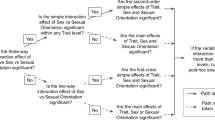Abstract
Love does not necessarily benefit its object, and cost-free love may damage both object and subject. Our love of animals mobilises several distinct human concerns and should not be considered always as a virtue or always as a benefit to the animals themselves. We need to place this love in its full psychological, cultural, and moral context in order to assess what form it ought to take if animals are to benefit from it.
Similar content being viewed by others
Notes
Adapting the celebrated remarks on anger in Nicomachean Ethics, Book IV, Chapter 5.
Among the many affecting accounts of this relationship in the literature, I single out George Pitcher, The Dogs Who Came to Stay (1995), since I knew the dogs and the author.
References
Cavell, S. 2002. Must we mean what we say? A book of essays. Cambridge: Cambridge University Press.
Flaubert, G. 1877. Trois contes. Paris: Georges Charpentier.
Pitcher, G. 1995. The dogs who came to stay. New York: Dutton.
Scruton, R. 2002. Animal rights and wrongs. London: Continuum.
Woods, M., R.A. McDonald, and S. Harris. 2003. Predation of wildlife by domestic cats Felis catus in Great Britain. Mammal Review 33(2): 174–188.
Author information
Authors and Affiliations
Corresponding author
Rights and permissions
About this article
Cite this article
Scruton, R. Our Love for Animals. Bioethical Inquiry 10, 479–484 (2013). https://doi.org/10.1007/s11673-013-9477-0
Received:
Accepted:
Published:
Issue Date:
DOI: https://doi.org/10.1007/s11673-013-9477-0




